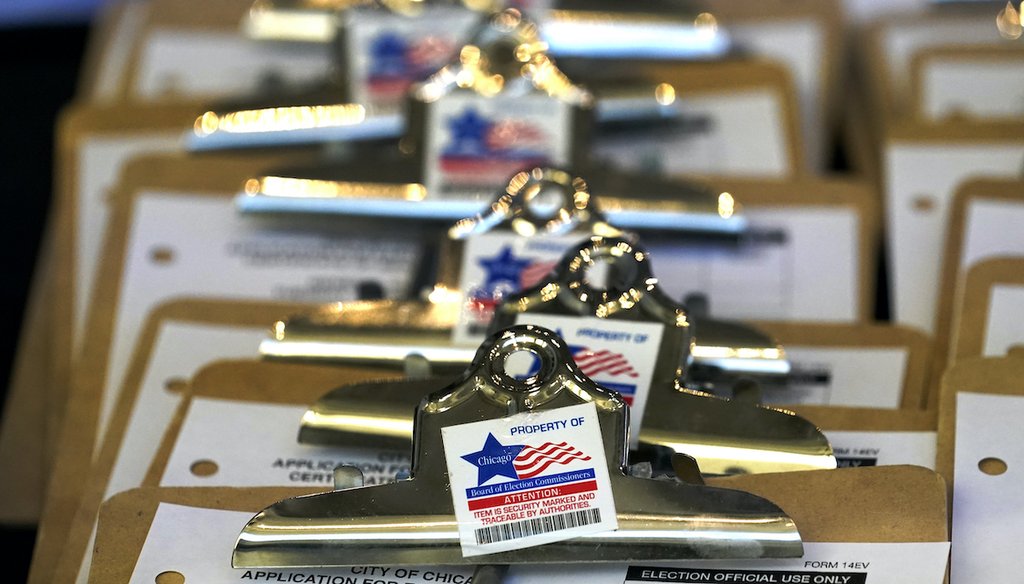Stand up for the facts!
Our only agenda is to publish the truth so you can be an informed participant in democracy.
We need your help.
I would like to contribute

Clipboards with voter registration forms sit on a table on Election Day, Tuesday, Nov. 3, 2020, at the United Center sports complex, a new super voting site in Chicago. (AP)
If Your Time is short
-
The Senate Democrats’ Freedom to Vote Act includes a requirement that each state allow any eligible individual to register at their polling place on the day of a federal election.
-
Currently, 20 states and Washington, D.C., offer same-day voter registration. It is offered in a mix of red, blue and battleground states.
-
Election officials say they take several steps with same-day voter registration to ensure the integrity of the vote.
As Democrats seek to set uniform election policies nationwide to make it easier to cast a ballot, one change on their wishlist would allow all Americans to register to vote on Election Day.
Senate Democrats have included a provision in the Freedom to Vote Act, their sweeping voting-rights bill, that would require all states to allow same-day registration. Only 20 states currently offer it.
Supporters say that it removes the registration deadline as a barrier to voting and offers people a convenient way to register and vote in one trip. Opponents say it adds work for election officials during their busiest time of year and poses a risk of fraud, though we have debunked that notion.
We wanted to take a closer look at the provisions of the bill, the prevalence of same-day registration, the criticisms of it, and how election officials make it work.
The election officials we spoke to acknowledged that same-day registration poses challenges, but generally dismissed the idea that it exposes elections to the risk of fraud.
Bill would ensure registration option at voting site
Elections are largely governed by state laws, but the Freedom to Vote Act would set uniform policies for all federal elections regarding mail-in ballots, early voting and voter registration.
Republicans have opposed the bill and say that states should continue to set their own election laws. The Senate was to begin voting on the bill on Jan. 19.
On voter registration, the legislation says that each state shall allow any eligible individual on the day of a federal election to register at their polling place to vote. That’s a stricter rule than some states with same-day registration observe. Michigan, for example, allows Election Day registration at a local clerk’s office, not at the voter’s polling place.
The National Conference of State Legislatures found that 20 states and Washington, D.C., offer some form of same-day registration. They include blue states such as Illinois and Minnesota, red states such as Wyoming and Idaho, and battlegrounds including Michigan and Wisconsin. Minnesota, Wisconsin and Maine pioneered same-day registration in the 1970s, and the practice became more common over the past decade.
Montana and North Carolina allow individuals to register during part of the early-voting period, but not on Election Day. In most other states, voters must register by a deadline, generally between eight and 30 days before the election.
State lawmakers have proposed bills within the past few months to create same-day registration in Pennsylvania and Massachusetts. Same-day registration is scheduled to start this fall in Virginia, but some proposed bills would reverse that plan. Arizona doesn’t have same-day registration, and a pending bill would prohibit it. New York voters rejected same-day registration in November 2021.
A Morning Consult/Politico poll in January found that 56% of respondents support same-day voter registration, but it was far more popular with Democrats (78% support) than Republicans (35%).
There is evidence that same-day registration increases turnout, according to the National Conference of State Legislatures, but it isn’t clear how much.
Research published by the University of Chicago Press in 2021 found same-day registration increases turnout among individuals ages 18 to 24 by between 3.1 and 7.3 percentage points. Young people are more likely to move a lot, making same-day registration particularly convenient for them. The findings mirror earlier studies.
Same-day voter registration includes validation steps
The Heritage Foundation, a conservative group, says same-day registration "gives election officials no time to verify the accuracy of the voter registration information and the eligibility of the individual to vote."
But states that offer same-day registration do have systems to verify eligibility, including requiring the prospective voter to present proof of residency. The rules about acceptable forms of ID beyond a driver’s license vary, with some states allowing prospective voters to use a paycheck or utility bill.
Many states require same-day registrants to sign an affidavit stating they have not already voted, and if they do double vote, they face criminal penalties.
"We have clear evidence that same-day registration is feasible to implement, makes it easier for people to access a constitutional right, and does not reduce the integrity of elections," said Georgetown University public-policy professor Donald Moynihan.
In a survey of Wisconsin election clerks published in a report by Pew Charitable Trusts in 2009, researchers at the University of Wisconsin-Madison found that the majority of election officials said that same-day registration increases their administrative burdens but that the benefits outweighed the costs.
Local elections officials in Minnesota, Wisconsin and Michigan told us that same-day registration requires some steps by their officials, but they didn’t describe it as a difficult hurdle.
"Think about the population you serve; it’s really the more efficient way to serve them rather than an arbitrary long date ahead of an election during which you have to register people," said Andy Lokken, elections director in Dakota County, Minnesota.
As a security measure, Minnesotans who newly register to vote are mailed a non-forwardable verification card. If the card for a voter who registered on Election Day is returned as undeliverable, officials follow up to verify the voter’s eligibility. If it doesn’t check out, they can refer the case to the county attorney for investigation and possible felony prosecution, said Paul Linnell, elections manager in Anoka County, in suburban Minneapolis.
Election officials in Minnesota told us they had seen a decline over the past decade in same-day registration due to the growth of online voter registration. For example in Anoka County, 18% of voters used Election Day registration in 2008 but only 8% in 2020.
In Michigan, voters in 2018 overwhelmingly passed Proposal 3, which amended the state constitution to guarantee access to no-excuse absentee voting and same-day voter registration. Michigan voters can’t register at their local polling place on Election Day, but they can register at the local clerk’s office, and receive a ballot there. Or they can take a signed registration receipt to their polling place to cast their ballot.
The new process led to long lines at clerks’ offices in college towns in March 2020, when Michigan held its presidential primary. But following public awareness efforts, new registrations leading up to the November election were more spread out, with fewer on Election Day itself, said Lawrence Kestenbaum, the Democratic clerk in Washtenaw County.
"We don’t believe that Election Day registration undermined trust in Michigan elections at all," said Kestenbuam. "I’m not hearing complaints about the security of the process."
Justin Roebuck, the Republican clerk of Ottawa County, a GOP stronghold in western Michigan, said that for Michigan, it made sense to put the responsibility of registration on clerks at their offices, rather than at the polling places.
"It has largely been a huge success, both in terms of allowing access for voters and as a secure system that prevents fraud," Roebuck said.
Voter fraud is rare
Critics of same-day registration continually raise the specter of the double voter, who votes in one place on Election Day, registers in another place with some form of identification, and then votes again. While that could conceivably happen, officials and experts say, it almost never does.
It’s highly unlikely that someone will engage in voter fraud through same-day registration because the risk of detection is high, said Moynihan, the Georgetown professor.
Same-day registration "requires an individual to come to a polling place and verify that they are who they say they are, and they are a resident of the area" and do that under the supervision of a public official, Moynihan said.
In Michigan, voters’ information is entered into a statewide database, most commonly using their driver license or state ID number, which will bring up records of any previous registration. A person who tried to register in two different places on Election Day would be flagged.
In general, cases of suspected voter fraud are exceedingly rare, and prosecutions even more so. The Associated Press reported in December that it found 475 potential cases of voter fraud in six battleground states in 2020 out of about 25.5 million votes cast. Nearly a third of those were from an investigation in Pima County, Arizona, where the county attorney announced in January that zero cases warranted prosecution.
Sara Bruckman, currently deputy clerk treasurer of the village of Fox Point, Wisconsin, said said in her eight years as an election official in the state, she could recall only one case where a voter cast a ballot, then used same-day registration with a different address and cast another ballot.
"We caught it within the next day," Bruckman said.
RELATED: As extremes shape voter ID debate, the rules keep getting stricter
RELATED: What’s in the Senate Democrats’ new voting rights bill?
RELATED: What’s in the voting rights bill named for John Lewis?
Our Sources
CBS, Transcript of "Face the Nation," Jan. 9, 2022
Congress.gov, S.2747 - Freedom to Vote Act, Introduced Sept. 14, 2021
National Conference of State Legislatures, Same day voter registration, Sept. 20, 2021
Voting Rights Lab state voting rights tracker, Pennsylvania House 2090 and Massachusetts Senate 2554
Arizona Legislature, HB 2237, 222
ABC 8 News, Virginia Democrats pushed to expand voter access, but will Republicans move to make changes after election wins? Dec. 9, 2021
Detroit News, Long lines, hour-long waits prompt criticism at Michigan polls, March 10, 2020
AP, Far too little vote fraud to tip election to Trump, AP finds, Dec. 14, 2021
Morning Consult/Politico, Poll, Jan. 8-9, 2022
Edward B Foley, Washington Post op-ed, Opinion: Is same-day voter registration good? Yes. Is it essential? Probably not. Sept. 20, 2021
Jacob M. Grumbach, assistant Professor of political science at the University of Washington and Charlotte Hill, University of California, Berkeley, University of Chicago Press, Rock the Registration: Same Day Registration Increases Turnout of Young Voters, 2021
Pew Research Center, How Americans view some of the voting policies approved at the ballot box, Nov. 15, 2018
University of Wisconsin Madison, The Effects and Costs of Early Voting, Election Day Registration, and Same Day Registration in the 2008 Elections, Dec. 21, 2009
Heritage Foundation, The Left Suffers a Big Defeat in Their Efforts to Damage Election Security, Dec. 1, 2021
Politico, Joe Biden won in Michigan, flipping a state Donald Trump won in 2016. Jan. 6, 2022
Pima County Attorney’s Office, PCAO Investigation Finds No Evidence Of 2020 Voter Fraud In Pima County, Jan. 14, 2022
Email interview, Lawrence Kestenbaum, Washtenaw County Clerk in MIchigan, Jan. 14, 2022
Telephone interview, Mary Clark, president of the Michigan Association of Municipal Clerks, Jan. 12 2022
Email interview, Sara Bruckman, deputy clerk treasurer for the village of Fox Point, Wisconsin, Jan. 12, 2022
Telephone interview, Andy Lokken, elections director in Dakota County, Minnesota, Jan. 11, 2022
Email interview, Paul Linnell, elections manager in Anoka County, Minnesota, Jan. 12, 2022
Email interview, Donald Moynihan, public policy professor at Georgetown University, Jan. 14, 2022












































